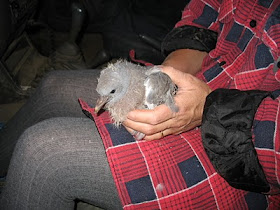Green acorns contain high levels of pyrogallol. Don't ask me what that is, I'm not a chemist. What I do know is that the pyrogallol is poisonous to pigeons (as well as horses, and probably a variety of other birds and mammals.) Young pigeons seem most susceptible, possibly because they're small and still developing. They have less body mass relative to an adult. And young pigeons are still learning the 'food' vs. 'not food' life lesson. Too many acorns is definitely 'not food' for pigeons.
I found this young squab in the middle of the road, staggering about, and too disoriented to escape my slow, lumbering approach.
He still has baby fluff, and you can see all the feather casings he's shedding onto my plaid shirt. He's not yet grown into his beak so he's quite young. I've put him in a spare broody coop overnight to protect him from hungry foxes and village cats. He may live, he may not (my record for rehabilitating baby birds has been 0 for 3 this year). If he doesn't, we'll do a post-mortem and see if, in fact, he has a cropful of acorn shells.
I hope he's simply recovered enough to fly away, and smart enough to head for the barley fields instead of the woods for his breakfast.

Oh wow. I'm kind of disappointed. I as starting to salivate already and I haven't even eaten squab yet...
ReplyDeleteBut I'm glad he's getting a second chance at contributing to the gene pool.
Hmmm. Mixed messages here, Jennifer. Squab: a tasty thing to find on one's plate. Hope for fledgling's recovery: altruism not leading to dinner. So if he lives, what's it going to be? But thanks for the primer on acorns and wood pigeon. Interesting stuff. I really must get out there and harvest some acorns for the chickens. I've been hearing them starting to drop.
ReplyDeletePaula & Kate - Squab continues to live, is eating and drinking. Once it's well enough to let go, then it takes its chances when we're pigeon hunting. I just can't stand to leave a wounded animal, especially young ones. Everything needs a crack at the whip, so to speak.
ReplyDeleteKate - Of course, chickens CAN eat acorns, can't they. Why is it toxic to pigeons then? How strange. I may have to investigate.
Good post as always. I'll be watching to see how the little guy does. Curious about the acorns.
ReplyDeleteKaren - I had one of those middle of the night epiphanies, wondering if it's only unripe acorns that have the pyrogallol in high concnetration. Ripe acorns perhaps not, though even ripe acorns are poisonous to horses in large quantities. Hmmmm
ReplyDelete